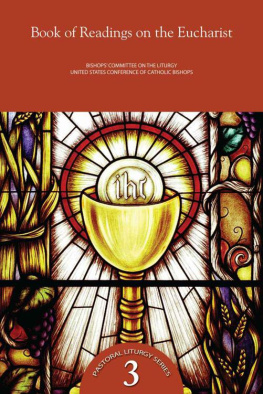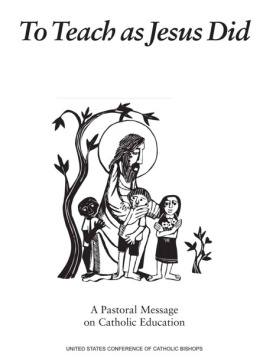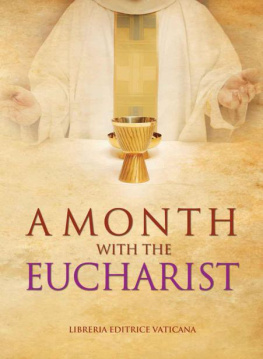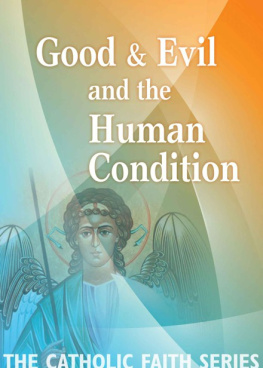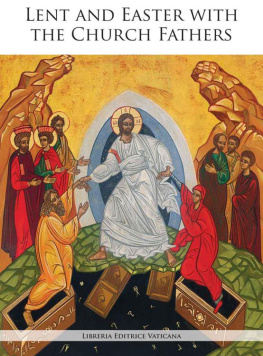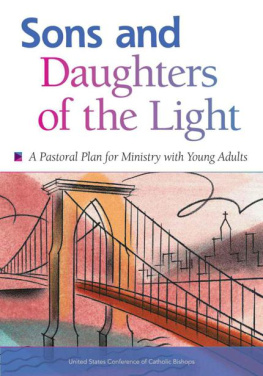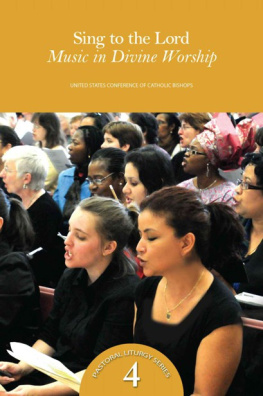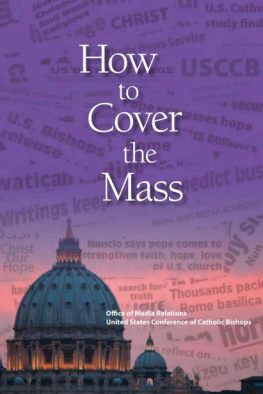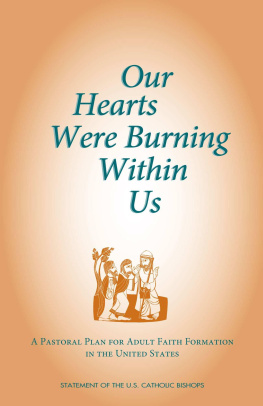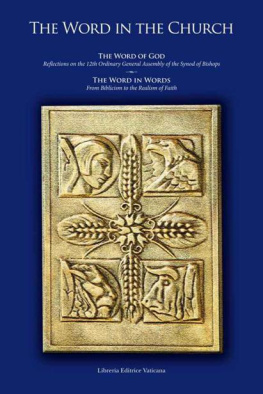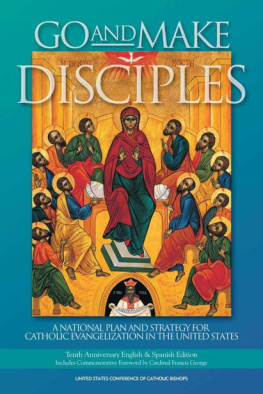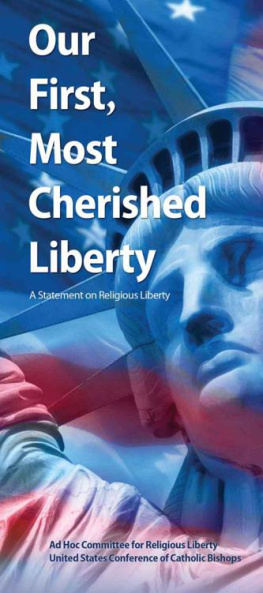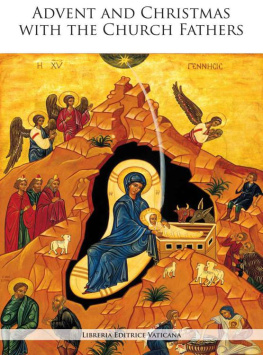United States Conference of Catholic Bishops - Book of Readings on the Eucharist
Here you can read online United States Conference of Catholic Bishops - Book of Readings on the Eucharist full text of the book (entire story) in english for free. Download pdf and epub, get meaning, cover and reviews about this ebook. year: 2006, publisher: Bishops’ Committee, genre: Religion. Description of the work, (preface) as well as reviews are available. Best literature library LitArk.com created for fans of good reading and offers a wide selection of genres:
Romance novel
Science fiction
Adventure
Detective
Science
History
Home and family
Prose
Art
Politics
Computer
Non-fiction
Religion
Business
Children
Humor
Choose a favorite category and find really read worthwhile books. Enjoy immersion in the world of imagination, feel the emotions of the characters or learn something new for yourself, make an fascinating discovery.
- Book:Book of Readings on the Eucharist
- Author:
- Publisher:Bishops’ Committee
- Genre:
- Year:2006
- Rating:5 / 5
- Favourites:Add to favourites
- Your mark:
- 100
- 1
- 2
- 3
- 4
- 5
Book of Readings on the Eucharist: summary, description and annotation
We offer to read an annotation, description, summary or preface (depends on what the author of the book "Book of Readings on the Eucharist" wrote himself). If you haven't found the necessary information about the book — write in the comments, we will try to find it.
United States Conference of Catholic Bishops: author's other books
Who wrote Book of Readings on the Eucharist? Find out the surname, the name of the author of the book and a list of all author's works by series.
Book of Readings on the Eucharist — read online for free the complete book (whole text) full work
Below is the text of the book, divided by pages. System saving the place of the last page read, allows you to conveniently read the book "Book of Readings on the Eucharist" online for free, without having to search again every time where you left off. Put a bookmark, and you can go to the page where you finished reading at any time.
Font size:
Interval:
Bookmark:
PASTORAL LITURGY SERIES THREE
BISHOPS COMMITTEE ON THE LITURGY
UNITED STATES CONFERENCE OF CATHOLIC BISHOPS
Washington, D.C.
FOREWORD
Mass and Eucharistic Procession for the Solemnity of the Body and Blood of Christ
POPE JOHN PAUL II
CHAPTER 1
The Eucharist Builds the Church
POPE JOHN PAUL II
CHAPTER 2
The Holy Eucharist Unites Heaven and Earth
CARDINAL FRANCIS ARINZE
CHAPTER 3
Eucharist in the Church and the World
CARDINAL FRANCIS GEORGE
CHAPTER 4
Theology of the Eucharist
ARCHBISHOP DANIEL PILARCZYK
CHAPTER 5
Eucharist and Trinity
FR. J. AUGUSTINE DINOIA, OP
CHAPTER 6
Sunday and the Eucharistic Celebration
MSGR. JAMES P. MORONEY
CHAPTER 7
The Eight Beatitudes of the Eucharistic Prayer FR. CHARLES E. MILLER, CM
CHAPTER 8
Eucharist as Formation for Mission
SR. ANN REHRAUER, OSF
CHAPTER 9
Eucharist and Justice
SR. JOYCE ANN ZIMMERMAN, CPPS
CHAPTER 10
Adoration of the Blessed Sacrament
FR. JEREMY DRISCOLL, OSB
CHAPTER 11
The Eucharist and Inculturation
SR. DORIS MARY TUREK, SSND
1. As often as you eat this bread and drink this cup, you proclaim the Lords death until he comes (1 Cor 11:26).
With these words St. Paul reminds the Christians of Corinth that the Lords Supper is not only a convivial meeting but also, and above all, the memorial of the redeeming sacrifice of Christ. Those who take part in it, the Apostle explains, are united with the mystery of the death of the Lord, and indeed, proclaim him.
Thus, there is a very close relationship between building the Eucharist and proclaiming Christ. At the same time, entering into communion with him in the memorial of Easter also means becoming missionaries of the event which that rite actualizes; in a certain sense, it means making it contemporary with every epoch, until the Lord comes again.
2. Dear brothers and sisters, we are reliving this wonderful reality in todays Solemnity of Corpus Christi, during which the Church does not only celebrate the Eucharist but solemnly bears it in procession, publicly proclaiming that the Sacrifice of Christ is for the salvation of the whole world.
Grateful for this immense gift, her members gather round the Blessed Sacrament, for that is the source and summit of her being and action. Ecclesia de Eucharistia vivit! The Church draws her life from the Eucharist and knows that this truth does not simply express a daily experience of faith, but recapitulates the heart of the mystery in which she consists (cf. Encyclical Letter Ecclesia de Eucaristia , no. 1).
3. Ever since Pentecost, when the Church, the People of the New Covenant, began her pilgrim journey towards her heavenly homeland, the Divine Sacrament has continued to mark the passing of her days, filling them with confident hope (ibid.). Thinking precisely of this, I wanted to dedicate the first Encyclical of the new millennium to the Eucharist and I am now pleased to announce a special Year of the Eucharist. It will begin with the World Eucharistic Congress, planned to take place from 10 to 17 October 2004 in Guadalajara, Mexico, and will end with the next Ordinary Assembly of the Synod of Bishops, that will be held in the Vatican from 2 to 29 October 2005 and whose theme will be: The Eucharist: source and summit of the life and mission of the Church .
Through the Eucharist, the Ecclesial Community is built up as a new Jerusalem, a principle of unity in Christ among different persons and peoples.
4. You give them something to eat (Lk 9:13).
The Gospel passage we have just heard offers us a vivid image of the close bond that exists between the Eucharist and this universal mission of the Church. Christ, the living bread which came down from heaven (Jn 6:51; cf. Gospel Acclamation ), is the only one who can appease the hunger of human beings of every time and in every corner of the earth.
However, he does not want to do this on his own , so he involves the disciples, as he did in the multiplication of the loaves: Taking the five loaves and the two fish he looked up to heaven, and blessed and broke them, and gave them to the disciples to set before the crowd (Lk 9:16). This miraculous sign is the symbol of the greatest mystery of love which is renewed every day at Holy Mass: through the ordained ministers, Christ gives his Body and his Blood for the life of humanity. And all those who partake of his Banquet with dignity become living instruments of his presence of love, mercy and peace.
5. Lauda, Sion, Salvatorem!... Sion, praise the Saviour / your guide, your pastor / with hymns and canticles.
With untold emotion, we hear this invitation to praise and joy echoing in our hearts. At the end of Holy Mass we will carry the Divine Sacrament in procession to the Basilica of St. Mary Major. Looking at Mary, we will understand better the transforming power that the Eucharist possesses. Listening to her, we will find in the Eucharistic mystery the courage and energy to follow Christ, the Good Shepherd, and to serve him in the brethren.
_____________
John Paul II, Homily at the Mass and Eucharistic Procession for the Solemnity of the Body and Blood of Christ, Basilica of St. John Lateran (June 10, 2004), http://www.vatican.va/holy_father/john_paul_ii/homilies/2004/documents/hf_jp-ii_hom_20040610_corpus-domini_en.html.
Chapter 2 from Encyclical On the Eucharist (Ecclesiae de Eucharistia)
21. The Second Vatican Council teaches that the celebration of the Eucharist is at the center of the process of the Churchs growth. After stating that the Church, as the Kingdom of Christ already present in mystery, grows visibly in the world through the power of God,
A causal influence of the Eucharist is present at the Churchs very origins. The Evangelists specify that it was the Twelve, the Apostles, who gathered with Jesus at the Last Supper (cf. Mt 26:20; Mk 14:17; Lk 22:14). This is a detail of notable importance, for the Apostles were both the seeds of the new Israel and the beginning of the sacred hierarchy. the actions and words of Jesus at the Last Supper laid the foundations of the new messianic community, the People of the New Covenant.
The Apostles, by accepting in the Upper Room Jesus invitation: Take, eat, Drink of it, all of you (Mt 26:26-27), entered for the first time into sacramental communion with him. From that time forward, until the end of the age, the Church is built up through sacramental communion with the Son of God who was sacrificed for our sake: Do this is remembrance of me... Do this, as often as you drink it, in remembrance of me (1 Cor 11:24-25; cf. Lk 22:19).
22. Incorporation into Christ, which is brought about by Baptism, is constantly renewed and consolidated by sharing in the Eucharistic Sacrifice, especially by that full sharing which takes place in sacramental communion. We can say not only that each of us receives Christ , but also that Christ receives each of us . He enters into friendship with us: You are my friends (Jn 15:14). Indeed, it is because of him that we have life: He who eats me will live because of me (Jn 6:57). Eucharistic communion brings about in a sublime way the mutual abiding of Christ and each of his followers: Abide in me, and I in you (Jn 15:4).
By its union with Christ, the People of the New Covenant, far from closing in upon itself, becomes a sacrament for humanity,
Font size:
Interval:
Bookmark:
Similar books «Book of Readings on the Eucharist»
Look at similar books to Book of Readings on the Eucharist. We have selected literature similar in name and meaning in the hope of providing readers with more options to find new, interesting, not yet read works.
Discussion, reviews of the book Book of Readings on the Eucharist and just readers' own opinions. Leave your comments, write what you think about the work, its meaning or the main characters. Specify what exactly you liked and what you didn't like, and why you think so.

